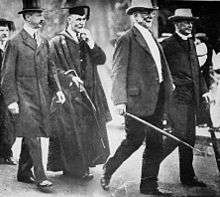Frank William Taussig
| Frank William Taussig | |
|---|---|
 Taussig circa 1915 | |
| Born |
December 28, 1859 St. Louis, Missouri |
| Died |
November 11, 1940 (aged 80) Cambridge, Massachusetts |
| Nationality | United States |
| Field | International economics |
| Alma mater | Harvard University |
| Influences | Charles F. Dunbar |
| Influenced |
Jacob Viner Clifford Clark |
Frank William Taussig (December 28, 1859 – November 11, 1940) was a U.S. economist and educator. Taussig is credited with creating the foundations of modern trade theory.
Biography

He was born on December 28, 1859 in St. Louis, Missouri, the son of William and Adele Wuerpel. His parents encouraged his literary and musical interests, and he played the violin at an early age. He was educated in the St. Louis public schools and at Smith Academy in that city. He then went to Washington University there, but after a year transferred to Harvard from where he graduated in 1879.[1] He then traveled in Europe for a year, taking some time to study economics at the University of Berlin. He then did graduate work at Harvard in law and economics, and during this time was secretary to President Charles W. Eliot for some years. He got a law degree in 1886 and was appointed assistant professor at Harvard.[2] He became professor of economics in 1892, and remained at Harvard for the balance of his professional career, except for several years spent in federal service, and some time spent traveling in Europe recovering from a nervous disorder.[1]
Taussig was also a Progressive and, like most Progressives of his time, an open advocate of forced sterilization of both inferior races and classes. In his 1911 textbook Principles of Economics, Taussing remarked that: "Certain types of criminals and paupers breed only their kind, and society has a right and a duty to protect its members from the repeated burden of maintaining and guarding such parasites... The human race could be immensely improved in quality, and its capacity for happy living immensely increased, if those of poor physical and mental endowment were prevented from multiplying."[3]
Paul Douglas (a future president of the American Economic Association) was a graduate student under Taussig at Harvard in the Fall of 1915 and recalled the experience. Douglas spent his first two years in graduate school at Columbia under Professor E. R. A. Seligman, who was an ideological enemy of Taussig. Being a favorite of Professor Seligman, Taussig seized upon this opportunity to humiliate the young Douglas and the Columbia school of economic thought to the delight of the Harvard pupils who filled the lecture hall to witness the "slaughter". Eventually Douglas would turn the tables and trap Professor Taussig in a logical economic debate. Douglas recalled, "The following day, Taussig cordially shook hands with me at the end of the hour . . . We also became fast friends for the rest of his life. Trying as the experience was, it was the best thing to happen to me in my academic life. It forced me to master the reasoning of the great economic theorists and to stand my ground under verbal and logical bombardment."[4]
He was editor of the Quarterly Journal of Economics from 1889 to 1890 and from 1896 to 1935; president of the American Economic Association in 1904 and 1905; and chairperson of the United States Tariff Commission from 1917 to 1919. In March 1919, he was called to Paris to advise in the adjustment of commercial treaties, and in November, on invitation of President Wilson, he attended the second industrial conference in Washington for promoting peace between capital and labour. He was a strong supporter of the League of Nations.
He died on November 11, 1940, aged 80, in Cambridge, Massachusetts. Taussig is buried in Mount Auburn Cemetery, Cambridge, Massachusetts.
Legacy
The successor to his chair at Harvard was Joseph Schumpeter. In 1888, he married Edith Thomas Guild. One of their four children was Helen Brooke Taussig (1898–1986), a noted pediatrician and cardiologist. F. W. Taussig's first wife died in 1910, and he married Laura Fisher.[1][2]
Works

- Protection to Young Industries as Applied to the United States (1883; second edition, 1886)
- History of the Present Tariff, 1860–83 (1885)
- The Tariff History of the United States (1888; sixth edition, revised, 1914), a standard work
- The Silver Situation in the United States (1892; third edition, revised, 1896)
- Wages and Capital (1896)
- Principles of Economics (1911; second edition, 1915)
- Some Aspects of the Tariff Question (1915)
- Inventors and Money Makers (1915), Brown University lectures
- Free Trade, the Tariff, and Reciprocity (1919)
Notes
- 1 2 3 Edward S. Mason (1958). "Taussig, Frank William". Dictionary of American Biography. Supplement Two. New York: Charles Scribner's Sons.
- 1 2 Ann T. Keene (1999). "Taussig, Frank William". American National Biography. New York: Oxford University Press.
- ↑ F. W. Taussig (1915). principlse of economics. pp. 236–.
- ↑ Douglas, Paul H. (1971). In the Fullness of Time. Harcourt Brace Jovanovich. pp. 28–34.
Sources
- Britannica Online
- Profile of Frank W. Taussig at the History of Economic Thought website.
- Department of Economics, University of Victoria
- Frank William Taussig at Find a Grave
-
 Chisholm, Hugh, ed. (1922). "Taussig, Frank William". Encyclopædia Britannica (12th ed.). London & New York.
Chisholm, Hugh, ed. (1922). "Taussig, Frank William". Encyclopædia Britannica (12th ed.). London & New York. -
 Gilman, D. C.; Thurston, H. T.; Colby, F. M., eds. (1905). "Taussig, Frank William". New International Encyclopedia (1st ed.). New York: Dodd, Mead.
Gilman, D. C.; Thurston, H. T.; Colby, F. M., eds. (1905). "Taussig, Frank William". New International Encyclopedia (1st ed.). New York: Dodd, Mead.
External links
| Wikimedia Commons has media related to Frank William Taussig. |
-
 Works written by or about Frank William Taussig at Wikisource
Works written by or about Frank William Taussig at Wikisource
|